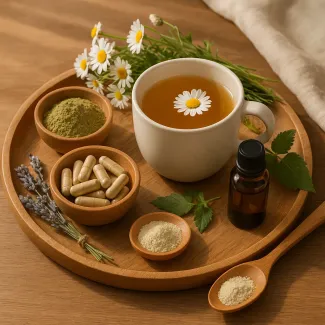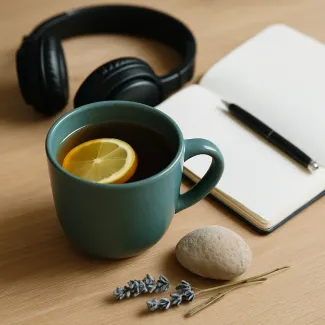
Holistic approaches for calming the mind and enhancing well-being in your 30s
Understanding the connection between age, anxiety, and mental health
As individuals enter their 30s, life often brings increased responsibilities, both personally and professionally. This phase may come with heightened stress, emotional challenges, and sometimes persistent anxiety that can impact overall mental well-being. Natural remedies can play an essential role in supporting emotional balance and fostering mental resilience without relying solely on pharmaceutical interventions.
The role of lifestyle changes in reducing anxiety naturally
Making thoughtful adjustments to daily routines can have a profound impact on mental health. Incorporating physical activity, balanced nutrition, and mindfulness practices are proven strategies for easing anxious thoughts and promoting a sense of calm.
Exercise as a powerful tool for stress relief
Regular physical exercise not only improves cardiovascular health, but also boosts the production of endorphins, natural chemicals that act as mood enhancers. Activities like brisk walking, cycling, swimming, or yoga can significantly reduce stress levels and contribute to mental clarity.
The impact of diet on mood and anxiety
What we eat directly influences brain chemistry. Diets rich in omega-3 fatty acids, magnesium, vitamin B complex, and antioxidants support optimal neurotransmitter function and can help mitigate anxiety symptoms. Adding more leafy greens, nuts, seeds, oily fish, and whole grains to daily meals provides essential nutrients for emotional stability.
Herbal remedies for natural anxiety relief
Various herbs and botanicals have long been used across cultures to ease nervous tension and support mental health. When used appropriately, these remedies can be an effective part of a holistic strategy.
Chamomile: A gentle ally for emotional balance
Chamomile tea is well-known for its soothing properties. The gentle sedative effect can help calm the mind, reduce irritability, and promote better sleep — all crucial for managing anxiety naturally.
Ashwagandha: Supporting resilience to stress
Ashwagandha, an adaptogenic herb, has been shown in studies to help regulate cortisol levels and enhance the body’s ability to cope with stress. This ancient remedy may assist in improving mood stability and reducing nervousness over time.
Lavender: Promoting calm through scent
The aroma of lavender has a well-established reputation for promoting relaxation. Using lavender essential oil in a diffuser or adding a few drops to a warm bath can create a tranquil atmosphere that helps ease restlessness and worry.
The importance of sleep for managing anxiety
Poor sleep quality can amplify feelings of anxiety and reduce the ability to cope with daily stressors. Establishing a consistent bedtime routine, limiting screen time in the evenings, and creating a calm sleep environment are key steps to improving sleep hygiene and supporting mental health.
Breathing techniques and meditation for inner peace
Simple practices like deep breathing exercises and guided meditation have demonstrated benefits in calming the nervous system. These tools can lower heart rate, decrease muscle tension, and improve focus, contributing to a greater sense of emotional balance.
Box breathing: A simple method to regain calm
Box breathing involves inhaling for four counts, holding the breath for four counts, exhaling for four counts, and holding again for four counts. Repeating this cycle can help interrupt the stress response and restore mental clarity during moments of anxiety.
The role of social connections in mental well-being
Maintaining strong relationships with friends and family can provide a valuable emotional anchor. Engaging in positive social interactions helps reduce feelings of isolation, which can exacerbate anxiety and negatively affect mental health.
Natural supplements that may ease anxiety
Certain nutritional supplements are recognized for their potential to support emotional well-being. These should always be used thoughtfully and, where possible, under the guidance of a healthcare provider.
Magnesium: A mineral for calming the nervous system
Magnesium plays a vital role in nerve function and can help relax muscles and calm overactive neural activity associated with anxiety.
L-theanine: Promoting focus and relaxation
Found in green tea, L-theanine is an amino acid that encourages relaxation without sedation. It may help reduce anxious feelings while enhancing mental alertness.
Reducing caffeine and alcohol to lower anxiety levels
Both caffeine and alcohol can contribute to heightened nervousness and disrupt sleep patterns, making anxiety harder to manage. Limiting these substances can support more stable mood and improved emotional resilience.
Creating a supportive daily routine
Establishing a predictable daily rhythm can help reduce uncertainty and enhance a sense of security. Regular meal times, designated periods for exercise, relaxation, and social engagement foster overall mental well-being.
Nature exposure as a natural stress reliever
Spending time in green spaces or near water has been associated with lower levels of cortisol, the primary stress hormone. Nature walks, gardening, or simply sitting in a park can contribute to emotional restoration and mental clarity.
Journaling as a tool for self-reflection
Writing about thoughts and feelings in a journal provides an outlet for processing emotions. This practice can help identify triggers for anxiety and clarify coping strategies, promoting greater self-awareness and emotional regulation.
Art, music, and creative expression for emotional healing
Engaging in creative activities like painting, playing an instrument, or dancing offers a constructive way to express emotions and release built-up tension. These activities can shift focus away from worry and foster a sense of accomplishment and joy.
The benefits of structured relaxation practices
Regular engagement with structured relaxation techniques such as progressive muscle relaxation, tai chi, or guided imagery can help retrain the body’s stress response, leading to greater emotional stability.
Hydration and its role in mental performance
Even mild dehydration can impair cognitive function and exacerbate feelings of anxiety. Ensuring adequate fluid intake throughout the day supports both physical and mental performance.
Limiting exposure to negative media
Constant exposure to distressing news or social media negativity can fuel anxiety and undermine mental health. Setting boundaries around media consumption allows space for more positive influences and reduces emotional overload.
The impact of volunteering and purposeful activity
Contributing to community efforts or engaging in purpose-driven work can provide a sense of meaning and connection, which buffers against anxiety and enhances overall mental well-being.
Sunlight and vitamin D for mood support
Getting adequate sunlight exposure helps regulate circadian rhythms and supports the production of vitamin D, both of which are important for maintaining a positive mood and managing anxiety levels.
The value of professional guidance alongside natural remedies
While natural remedies provide valuable support, seeking professional guidance can ensure that underlying conditions are addressed and that strategies are tailored to individual needs, optimizing overall mental health outcomes.

